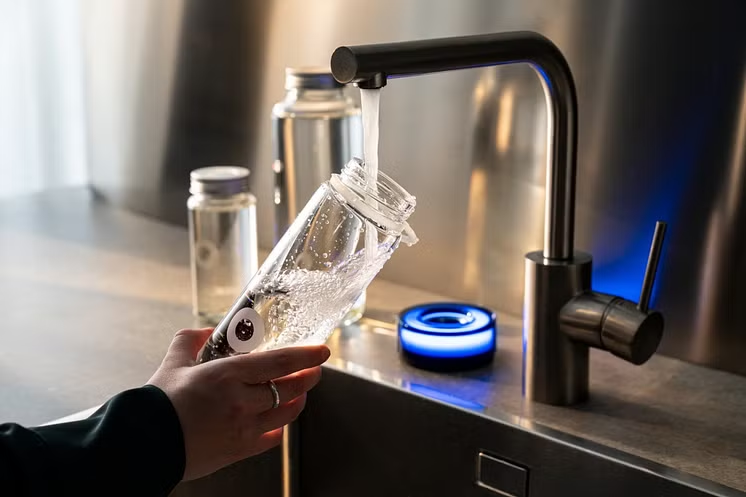7 Ways to Help Beat the Bloat, the Natural Way…
Ladies! Do you often feel bloated and dread putting on that LBD or squeezing into those high-waist jeans? New research has suggested that it takes, on average, four hours longer for women to digest food then men. We have asked Nutritionist Cassandra Barns on why this may be the case.
 She says: “There are various differences between men and women’s digestive systems. Women’s digestive tracts are slightly longer – around 10 cm. They also have a different shape than the male gut and have less space because of the room taken up by the reproductive organs including the uterus and ovaries. Higher levels of testosterone also keep the abdominal wall tighter in men. All these factors mean that bloating and constipation are more likely to occur in women.”
She says: “There are various differences between men and women’s digestive systems. Women’s digestive tracts are slightly longer – around 10 cm. They also have a different shape than the male gut and have less space because of the room taken up by the reproductive organs including the uterus and ovaries. Higher levels of testosterone also keep the abdominal wall tighter in men. All these factors mean that bloating and constipation are more likely to occur in women.”
This means that women need to pay more attention to good digestion if they want to avoid the bloat and here are Cassandra’s top tips:
-
Slow and steady
The old saying ‘slow and steady wins the race’ is true when it comes to your digestion! Cassandra explains: “Chewing takes place to break down our food into small particles. If you don’t chew properly, the rest of the digestive process cannot take place, as it should. This can cause bloating, flatulence and cramping.” It may seem obvious, but not chewing properly can be a major contributor to bloating.
“Try to chew each mouthful until the food is liquid, this will help to make sure the food is properly digested and will encourage you to eat slower. Also, when you take more time to thoroughly chew and taste your food, your snack or meal becomes more satisfying and so will help to prevent you from over eating,” adds Dr. Marilyn Glenville, author of Natural Alternatives to Sugar (www.marilynglenville.com).
-
Get your diet right
In terms of what to eat, problem foods can vary a lot between individuals. One of the most successful approaches for bloating and IBS is the ‘low-FODMAP’ diet developed by Monash University in Australia2, which limits sources of fermentable carbohydrates, explains Cassandra. Try to stick to the FODMAP diet for a couple of months and then start to slowly re-introduce food groups that are eliminated from the diet. This is a great way to seek out what you’re sensitive to and how your body reacts to different foods.
-
Probiotic Support
 Cassandra adds: “We also know that digestion – including transit time through the gut – can be affected by the bacteria that live there. So, a good-quality probiotic supplement could help move things along and improve digestive comfort,” explains Cassandra. Taking a probiotic supplement can help re-balance the good bacteria in your gut, support digestion and reduce symptoms of intolerance. “Try Mega8 Biotix by Quest Nutra Pharma (from £13.29, www.qnutrapharma.com ), which contains 8 different strains of bacteria to help improve your digestive health.” – sponsored credit – Shine was sent a sample and can report that these probiotics are very high quality and great for bloating.
Cassandra adds: “We also know that digestion – including transit time through the gut – can be affected by the bacteria that live there. So, a good-quality probiotic supplement could help move things along and improve digestive comfort,” explains Cassandra. Taking a probiotic supplement can help re-balance the good bacteria in your gut, support digestion and reduce symptoms of intolerance. “Try Mega8 Biotix by Quest Nutra Pharma (from £13.29, www.qnutrapharma.com ), which contains 8 different strains of bacteria to help improve your digestive health.” – sponsored credit – Shine was sent a sample and can report that these probiotics are very high quality and great for bloating.
-
Drink More
“If you’re feeling bloated you might think it is best not to drink, but not drinking actually makes fluid retention worse, in the same way that crash dieting makes the body hang onto fat because it thinks it’s starving. I’d recommend a herbal tea, such as Dandelion tea, as this contains a natural diuretic that helps you restore a healthy fluid balance. I’d recommend that you avoid gas making fizzy drinks”, explains Marilyn.
-
Get your heart rate up
Getting enough exercise is important as it helps to stimulate the digestive tract and move food along, which is especially important for women. “Good physical activity may therefore benefit those with constipation in particular. Exercise may also help with bloating and other IBS-type symptoms – perhaps mainly by relieving stress. For this reason, gentle and relaxing exercises such as Yoga and Pilates may be the most beneficial,” adds Marilyn.
-
Nature’s Tranquiliser
“Magnesium has been known as ‘natures tranquiliser’ as it helps to relax our muscles and nerves, which can help combat against cramping and constipation. Magnesium increases the water in your intestines, helping to initiate a wave like motion to move fecal matter through the intestines, therefore aiding digestion. Try to include dark leafy greens, nuts, seeds, fish, whole grains and bananas in your diet, which are all rich in magnesium. Alternatively, to make sure you’re getting your daily dose I would recommend taking Natures Plus KalmAssure Magnesium Capsules (£11.75, www.naturesplus.co.uk), which are very easy to absorb and easily delivered to the tissues,” explains Cassandra.
-
Switch your coffee for a turmeric latte
Black coffee can trigger bloating problems because of its high acidity, so it can be an irritant for the gut. Try swapping your coffee for a turmeric latte. Research has suggested that turmeric aids in improving digestion by increasing the activity of digestive enzymes.[i] Not a fan of the turmeric flavour? Turmeric can attribute its health benefits to curcumin, as it is the primary active component. Nature’s Plus Source of Life Garden Curcumin (£23.81, www.planetorganic.com) provides a high concentration as well as it being organic certified. One capsule can give you as much curcumin as several teaspoons of turmeric powder!














